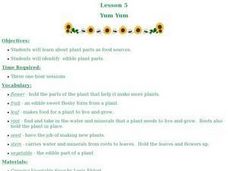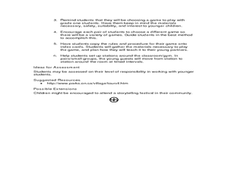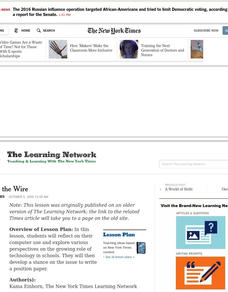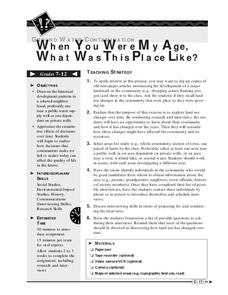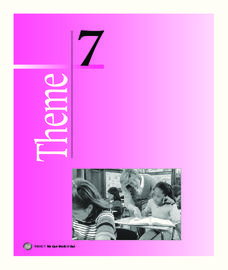Curated OER
Don't Use it All Up
Students observe the way that a sponge absorbs liquids and discuss how we our use of natural resources affects the environment around us. They discuss the need to conserve resources so we don't run out of what we need.
Workforce Solutions
Speed Interviewing
An important part of the job search process is the personal interview. Help pupils prepare with speed interviewing activity—teams of three-act as a job seeker, interviewer, and observer. Every three minutes, participants rotate roles and...
Workforce Solutions
30 Seconds
Attention spans are short, but memories are long. Job seekers are challenged to develop a 30-second commercial that highlights their strengths in a job interview.
Curated OER
Gardening with Your Students
By growing a class or school garden you can teach students about the environment, the life cycle of a plant, and healthy eating.
Curated OER
Hazardous Waste Cleanup Methods
Students examine how hazardous wastes are cleaned up. They work together to identify the positives and negatives of cleaning up certain hazardous wastes. They answer questions as part of the activity.
Curated OER
Yum Yum: Making Vegetable Soup
Students investigate agriculture by reading a book. In this plant life lesson, students read the book Growing Vegetable Soup by Louis Ehlert, and examine the ingredients used in the book's soup. Students create an experimental,...
Curated OER
The Mural of the Story
Young scholars write a description of what they believe is on the ceiling of the Sistine Chapel. After reading an article, they discuss the restoration of the mural on its ceiling. They brainstorm a list of important buildings and...
Curated OER
Extraordinary Extrapolation
Students study how scientists have estimated the maximum height to which trees can grow, and assess the reliability of interpolation and extrapolation techniques by making predictions with particular data sets and analyzing accuracy of...
Curated OER
Kick-Off Seed Explorations
Students explore fruit seeds and recognize that fruit seeds grow into plants like their parent fruit. For this seed lesson, students classify seeds. Students complete a KWL. Students name the fruit the seed is from.
Curated OER
Children: Then & Now
Fourth graders discuss the roles and responsibilities of family members in their homes today. They decide what they do to help their families both inside and outside the home. They realize why it is important for each person to...
Curated OER
Down to the Wire
Students reflect on their computer use and explore various perspectives on the growing role of technology in schools. They develop a stance on the issue to write a position paper.
Curated OER
When You Were My Age, What Was This Place Like?
Students discover how land use in their community has changed. In this community and ecology lesson, students scan old newspapers to find articles about the development of community land. Students discuss and predict how land use has...
Curated OER
The Teenage Single Parent
Students examine the challenges a single teenage parent faces. In groups, they research ways to positively cope with an unplanned pregnancy and design their own layette for their new baby. As a class, they discuss what it means to be...
Curated OER
Labor Unions and Strikes
Teens explore economics by listening to a labor history lecture and an excerpt from Looking Backward, by Edward Bellamy. A detailed outline is provided for the lecture, along with follow up and assessment questions. In groups, they...
Curated OER
Conflict Corner
In this conflict resolution worksheet, students act as a host to a radio show where people with conflicts call in to get advice. Students are given 4 situations to write a response including a description, why resolving is important and...
K12 Reader
Water Carves the Land
What affect do bodies of water have on the world around us? Kids can find out by reading this passage. After reading, they answer five questions related to the text.
Houghton Mifflin Harcourt
We Can Work It Out: English Language Development Lessons (Theme 7)
Listen, look, speak, and move are the routine steps of the English language development lessons found in a We Can Work It Out themed unit. Language proficiency is reinforced through picture cards, poems, and grand discussions about...
K5 Learning
Landforms
Valleys, mountains, and plateaus are just a few geographic landforms on our Earth. Read about these types and more in a brief landform passage. After reading, learners respond to six short answer comprehension questions.
Virginia Department of Education
Meiosis
Intrigue the class by completing a lesson plan on meiosis, filled with challenging and insightful activities to spark the interest of every person in the room. Each member of the class learns about genetic disorders due to faulty...
Carolina K-12
Propaganda, Spin and Soundbite Politics
It's all about the spin! In an introduction to propaganda techniques and soundbite politics, scholars first learn about common propaganda techniques before seeing them in action in the context of the 2016 election cycle. Activities...
Massachusetts Institute of Technology
Nuclear Synthesis
Start this lesson with a bang! The eighth in a 13-part series of lessons explains the origin of elements beginning with the Big Bang Theory. The reading describes the formation of elements hydrogen through uranium.
Vanier College
Analyzing Short Stories/Novels
Good questions can help focus readers' attention on the elements writers use to add depth to their stories. The questions on this worksheet do just that and encourage readers to think critically about a story and author's purpose.
Curated OER
Childhood
In this writing worksheet, pairs of students examine, discuss and complete a variety of activities associated with all the aspects of childhood. The activities are thought-provoking. Students must read a selection on a website embedded...
Curated OER
New York State Testing Program English Language Arts Test Book 2: Grade 7
In this New York State Testing Program English Language Arts worksheet, students listen to a passage and answer ten multiple choice questions to check comprehension. Students then complete an essay response.







